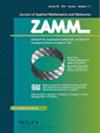Magnetic field and dissipation effects on mixed convection viscous fluid flow by a channel in the presence of porous medium and heat generation/absorption phenomenon
IF 3.2
4区 工程技术
Q1 MATHEMATICS, APPLIED
Zamm-zeitschrift Fur Angewandte Mathematik Und Mechanik
Pub Date : 2023-10-20
DOI:10.1002/zamm.202300625
引用次数: 0
Abstract
Abstract In this study, we investigate the phenomenon of mixed convection in viscous fluid flow by a vertical channel, considering the presence of magneto‐hydro‐dynamics and porosity. Mixed convection occurs when both buoyancy forces and external forces, such as pumps or fans, influence the flow behavior. Understanding and accurately predicting mixed convection is crucial for optimizing heat exchanger design and performance. To model the temperature equation, we utilize the concept of the first law of thermodynamics. Additionally, we incorporate effects such as Joule heating, heat generation, and radiative heat flux in the energy equation modeling. The resulting physical liquid equations are solved using the shooting technique with the RKF (Runge–Kutta–Fehlberg) scheme. We present graphical representations of the flow variables, discussing their behavior in detail. The introduction provides an overview of the paper's roadmap, while the conclusion highlights the main and significant results obtained from our study. We found that, the temperature is more when liquid motion in between channel for large numerical values of thermal radiation parameter and Reynolds number.存在多孔介质时,磁场和耗散对混合对流粘性流体通过通道流动的影响及产热/吸热现象
在本研究中,考虑到磁流体动力学和孔隙率的存在,我们研究了粘性流体在垂直通道中的混合对流现象。当浮力和外力(如泵或风扇)共同影响流动行为时,就会发生混合对流。理解和准确预测混合对流对于优化换热器的设计和性能至关重要。为了模拟温度方程,我们利用热力学第一定律的概念。此外,我们将焦耳加热、热量产生和辐射热通量等效应纳入能量方程建模中。用RKF (Runge-Kutta-Fehlberg)格式求解得到的物理液体方程。我们给出了流动变量的图形表示,详细讨论了它们的行为。引言提供了论文路线图的概述,而结论则强调了从我们的研究中获得的主要和重要结果。我们发现,当热辐射参数和雷诺数数值较大时,液体在通道间运动时温度更高。
本文章由计算机程序翻译,如有差异,请以英文原文为准。
求助全文
约1分钟内获得全文
求助全文
来源期刊
CiteScore
3.30
自引率
8.70%
发文量
199
审稿时长
3.0 months
期刊介绍:
ZAMM is one of the oldest journals in the field of applied mathematics and mechanics and is read by scientists all over the world. The aim and scope of ZAMM is the publication of new results and review articles and information on applied mathematics (mainly numerical mathematics and various applications of analysis, in particular numerical aspects of differential and integral equations), on the entire field of theoretical and applied mechanics (solid mechanics, fluid mechanics, thermodynamics). ZAMM is also open to essential contributions on mathematics in industrial applications.

 求助内容:
求助内容: 应助结果提醒方式:
应助结果提醒方式:


